March 2024

We create avenues for the industry to gain more insights into emerging trends, industry-specific problems of national importance, and global best practices in logistics & supply chain management. We enable the industry to cut down transaction costs, increase efficiency, and enhance profitability. We are committed to sensitizing the industry about macro-level issues and helping find solutions to them.
News highlights from the world of supply chain and logistics that appeared in media over the last one month

|
| Prime Minister Narendra Modi laid the foundation stones for three new semiconductor plants through video conferencing on March 13, 2024. The projects – two in Gujarat and one in Assam – valued at ₹1.25 lakh crore mark a crucial step towards India's efforts to become a global hub for semiconductor manufacturing, reported the Hindustan Times. The Prime Minister expressed optimism about the transformative impact of the semiconductor projects. “Today is going to be a historic day. We are not only scripting history today but also taking a step forward towards a bright future. This will help in making India a global hub for semiconductor facilities,” he said. He emphasised the importance of a reliable and resilient supply chain, especially in the wake of challenges posed by the pandemic, stated the paper. |
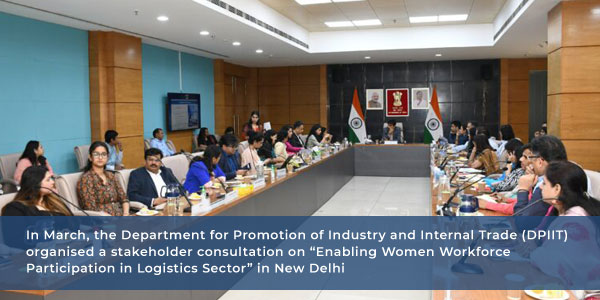
|
| In March, the Department for Promotion of Industry and Internal Trade (DPIIT) organised a stakeholder consultation on “Enabling Women Workforce Participation in Logistics Sector” in New Delhi. The meeting’sobjective was to catalyse the participation of women in the logistics sector, a critical component of the nation’s Viksit Bharat vision 2047, reported the PIB. Mr. Rajeev Singh Thakur, Additional Secretary, DPIIT, highlighted the importance of gender diversity for the growth and innovation of the logistics industry in his keynote address. The event brought together over 50 professionals from various industry associations, MSMEs, large enterprises, skill training institutes, and academia to discuss the way forward for gender inclusivity in logistics. Success stories and best practices from around the globe illustrating the transformative impact of women’s increased involvement in the sector were shared, according to the release. |
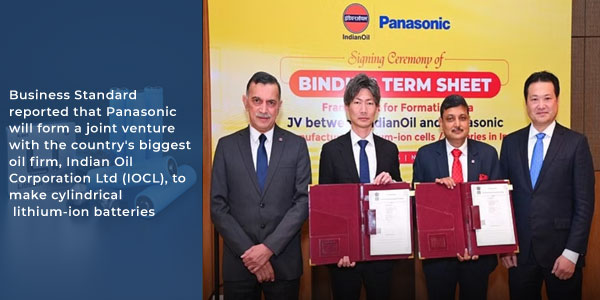
|
| Business Standard reported that Panasonic will form a joint venture with the country's biggest oil firm, Indian Oil Corporation Ltd (IOCL), to make cylindrical lithium-ion batteries. According to a company statement, Panasonic Energy Co Ltd, a Panasonic group firm, has signed a binding term sheet and initiated discussions with IOCL "to draw a framework for forming a joint venture" to manufacture cylindrical lithium-ion batteries. "This initiative is driven by the anticipated expansion of demand for batteries for two- and three-wheel vehicles and energy storage systems in the Indian market," the release said. Cylindrical lithium-ion batteries are used in consumer electronics, electricity-powered equipment, and electric vehicles. Panasonic Energy is a maker of automotive lithium-ion batteries. The paper stated that the two companies are doing a feasibility study about using battery technology to facilitate the transition to clean energy in the country. |
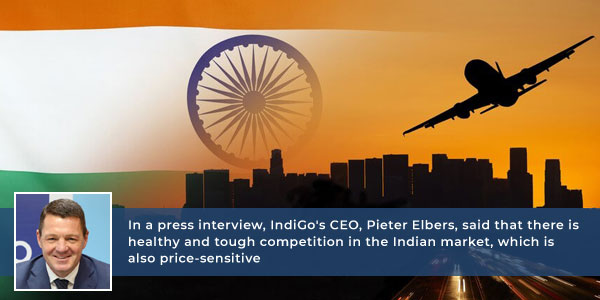
|
| In a press interview, IndiGo's CEO, Pieter Elbers, said that there is healthy and tough competition in the Indian market, which is also price-sensitive. He mentioned that India's overall price levels are "very, very competitive," which is a part of the change and diversity in the country. India's aviation market is one of the world's fastest-growing, with an average of 4.3-4.5 lakh daily domestic air traffic and airlines carrying more than 15.20 crore passengers in 2023. Although air traffic continues to rise and airlines expand their operations by connecting new destinations, there are concerns in certain quarters about airfares being higher, especially during peak seasons. Air ticket prices in the country are deregulated, and fares are mostly a function of supply and demand. Despite this, there is enormous demand for travel, and the competition in the market is tough and healthy, stated the article. |
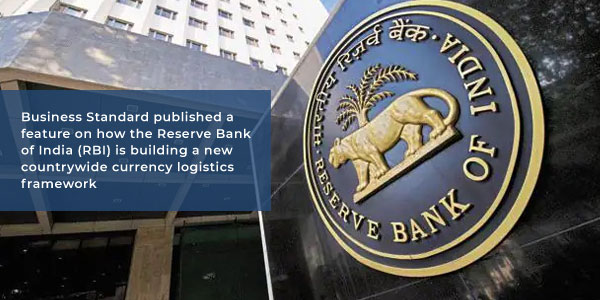
|
| Business Standard published a feature on how the Reserve Bank of India (RBI) is building a new countrywide currency logistics framework. The article noted that RBI issues and manages currency – banknotes and coins – through 19 offices, currency chests, and small coin depots. In FY23, the State Bank of India accounted for the highest share at 53.14 per centof currency chests. RBI's revamping of its systems in FY19, which involved, among other steps, ensuring bigger storage units, markedly improved the bank's currency management system, stated the feature. |
INTERNATIONAL
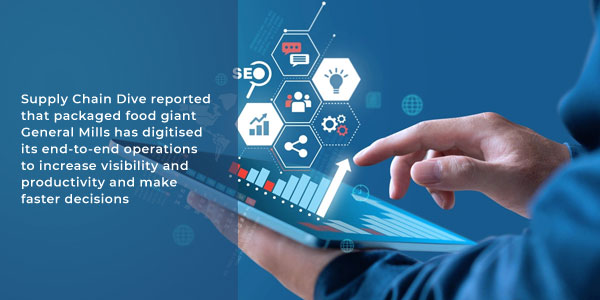
|
| In recent years, many large businesses have embraced digital transformation to stay competitive and better respond to supply chain disruptions. Supply Chain Dive reported that packaged food giant General Mills has digitised its end-to-end operations to increase visibility and productivity and make faster decisions. The company has faced supply chain disruptions in the last few years for various reasons such as commodity inflation, war in the largest grain-producing region, labour shortages, freight and port snarls, and the pandemic. However, the article said that General Mills had built resilience in its supply chain before these events occurred. Paul Gallagher, General Mills’ chief supply chain officer, joined the company as VP of its North American supply chain in 2019 and was tasked with transforming General Mills' supply chain network to drive competitive advantage for the business. The digitisation of end-to-end operations has helped the company increase efficiency and productivity across the supply chain. General Mills' investment in digitisation has helped it weather supply chain disruptions and continue to meet customer demand. |

|
| America’s agriculture newsportal The Packer reported that the U.S. Customs and Border Protection (CPB) recently announced its partnership with the Food and Drug Administration (FDA) to expand the Global Business Identifier test to address supply chain traceability. Through this partnership, CPB plans to assess the functionality and effectiveness of identifiers to address data gaps in its Manufacturing/Shipper Identifier requirement for the U.S. market. The report said the Global Business Identifier test will be extended for three more years. The collaboration between CPB and FDA aims to enhance supply chain security and help prevent the entry of illicit and harmful products into the US market. “Traceability is key to the FDA’s mission," Dan Solis, FDA assistant commissioner for import operations, stated in the release. "It enables us to leverage verifiable information at the supply chain level to identify risk and make admissibility decisions — ensuring the food, medicine and other FDA-regulated goods entering the United States are safe and get to those who need them as quickly as possible," he added. |
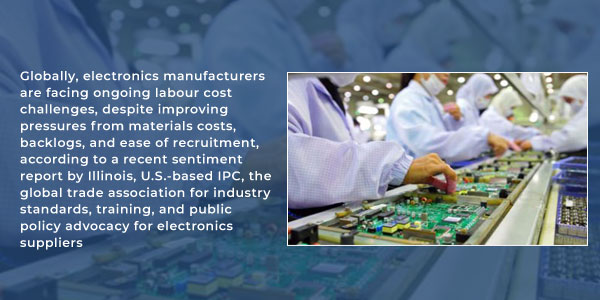
|
| Globally, electronics manufacturers are facing ongoing labour cost challenges, despite improving pressures from materials costs, backlogs, and ease of recruitment, according to a recent sentiment report by Illinois, U.S.-based IPC, the global trade association for industry standards, training, and public policy advocacy for electronics suppliers. IPC conducted a survey between Jan. 15 and Jan. 31, 2022, revealing that the demand in the electronics supply chain remains in expansionary territory, per a Supply Chain Management Review feature. The IPC report also found that new orders increased to their highest levels since November 2023, and the outlook is positive for the industry. The Shipments Outlook Index rose by 6 points, while the Backlog Outlook Index rose by 5 points, indicating expansion. The survey results provide further insights into the electronics manufacturing sector, which is facing increasing challenges in the current global economic climate. Despite these challenges, the industry appears to be making progress, with positive growth potential on the horizon. |
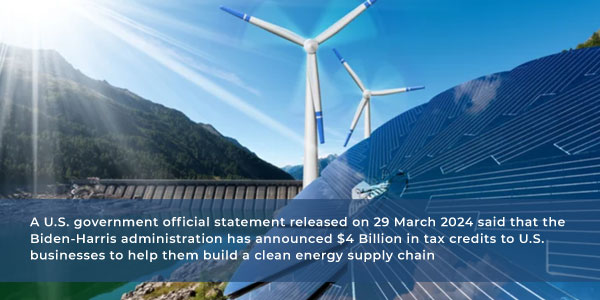
|
| A U.S. government official statement released on 29 March 2024 said that the Biden-Harris administration has announced $4 Billion in tax credits to U.S. businesses to help them build a clean energy supply chain. The U.S. Department of Energy (DOE), the U.S. Department of Treasury, and the Internal Revenue Service (IRS) announced the $4-billion tax-credit support for over 100 projects across 35 states to accelerate domestic clean energy manufacturing and reduce greenhouse gas emissions at industrial facilities, per the release. The statement said the initiative aims to help catalyse the nation’s equitable transition to a clean, secure, affordable, and resilient energy system and create high-quality jobs nationwide. |

|
| Sportswear giant Nike has announced its 2025 sustainability targets as it continues to progress in reducing its carbon footprint, as reported by. The company's 2023 Impact Report highlights its achievements in several key areas, including a significant increase in the use of renewable energy. In 2023, 96% of Nike's energy needs were fulfilled by renewable sources, compared to just 48% in 2020. The report also revealed that the company's Scope 1 and 2 emissions have decreased by 69% from 2020 to 2023 and 73% against a 2015 baseline. Nike has set a series of 2025 carbon targets to accelerate its efforts further. According to the report, the company has also achieved 100% waste diversion from landfills in its extended supply chain, with 80% of waste recycled into Nike products and other goods. [Editor's Note: Scope 1 emissions are Direct GHG Emissions, Scope 2 emissions are Electricity Indirect GHG Emissions, and Scope 3 emissions are Other Indirect GHG Emissions. Learn more here.] |

|
| A New York Times feature explored whether Artificial Intelligence will make companies more efficient. The article noted that rapid productivity improvement is the dream for companies and economic policymakers because organisations experiencing productivity booms can see rapid wage gains and growth without much inflation risk.Some economists believe AI will take off in the coming decade, leading to rapid growth in productivity. Many companies already use AI and generative AI for various purposes, hoping that AI will revolutionise their workplaces and increase productivity. The article quoted Stanford University's Erik Brynjolfsson, who thinks that productivity will take off this decade, based on an experiment he conducted with AI at a large call centre. |
We will connect again next month, with a comprehensive dossier of news, trends and events from the industry.
| Courtesy: Newsletter content developed by Mr. Aanand Pandey | ||